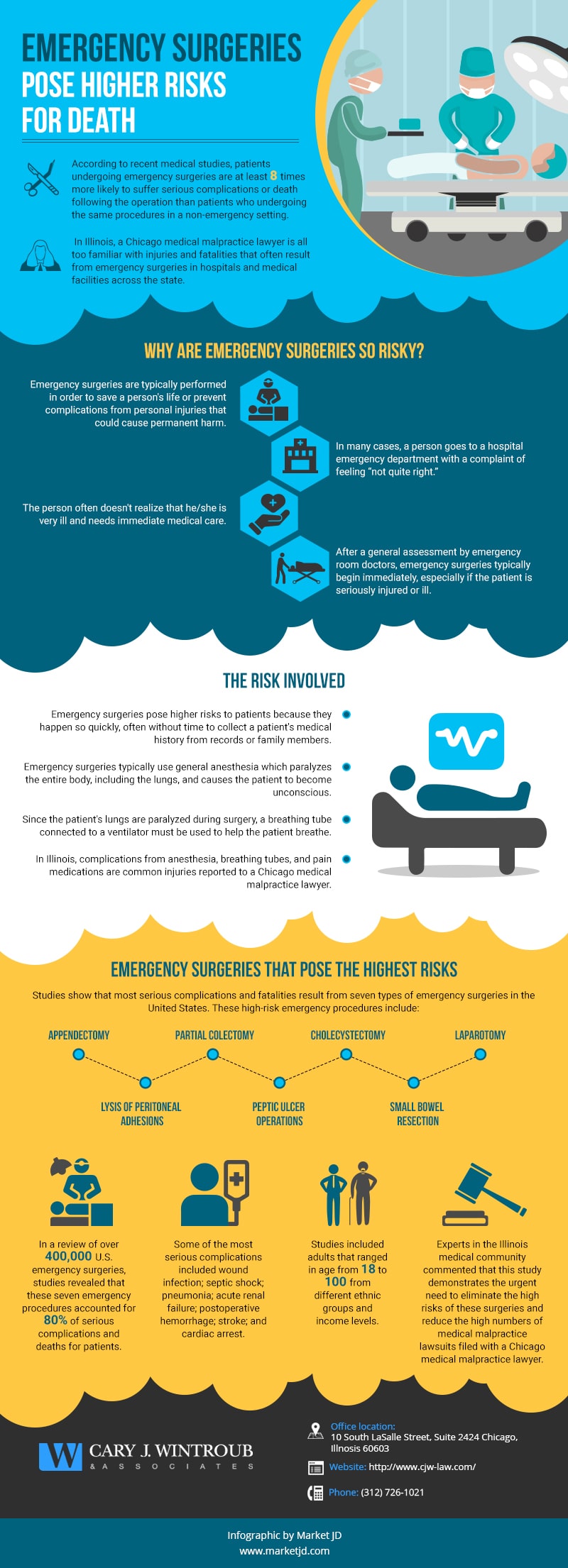Emergency Surgeries Pose Higher Risks for Death
According to recent medical studies, patients undergoing emergency surgeries are at least eight times more likely to suffer serious complications or death following the operation than patients who undergo the same procedures in a non-emergency setting. In Illinois, a Chicago medical malpractice lawyer is all too familiar with injuries and fatalities that often result from emergency surgeries in hospitals and medical facilities across the state.
(Article continues below Infographic)
Why are Emergency Surgeries So Risky?
Emergency surgeries are typically performed in order to save a person’s life or prevent complications from personal injuries that could cause permanent harm. In many cases, a person goes to a hospital emergency department with a complaint of feeling “not quite right.” The person often doesn’t realize that he/she is very ill and needs immediate medical care. After a general assessment by emergency room doctors, emergency surgeries typically begin immediately, especially if the patient is seriously injured or ill.
Emergency surgeries pose higher risks to patients because they happen so quickly, often without time to collect a patient’s medical history from records or family members. Emergency surgeries typically use general anesthesia which paralyzes the entire body, including the lungs, and causes the patient to become unconscious. Since the patient’s lungs are paralyzed during surgery, a breathing tube connected to a ventilator must be used to help the patient breathe. In Illinois, complications from anesthesia, breathing tubes, and pain medications are common injuries reported to a Chicago medical malpractice lawyer.
Emergency Surgeries that Pose the Highest Risks
Studies show that most serious complications and fatalities result from seven types of emergency surgeries in the United States. These high-risk emergency procedures include:
- Appendectomy
- Partial colectomy
- Cholecystectomy
- Laparotomy
- Lysis of peritoneal adhesions
- Peptic ulcer operations
- Small bowel resection
In a review of over 400,000 U.S. emergency surgeries, studies revealed that these seven emergency procedures accounted for 80 percent of serious complications and deaths for patients. Some of the most serious complications included wound infection; septic shock; pneumonia; acute renal failure; postoperative hemorrhage; stroke; and cardiac arrest. Studies included adults that ranged in age from 18 to 100 from different ethnic groups and income levels. Experts in the Illinois medical community commented that this study demonstrates the urgent need to eliminate the high risks of these surgeries and reduce the high numbers of medical malpractice lawsuits filed with a Chicago medical malpractice lawyer.




